|
|
|
Eric Benét
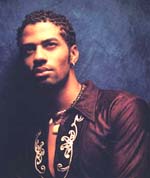 Eric
Benét is a man of music, and good music at that, as his album "True
To Myself " and singles clearly illustrates. This 27-year old
singer/songwriter from Milwaukee, Wisconsin, is definitely on to something that you don't
wanna miss. Not only does he possess a smooth and expressive tenor, but his lyrics reach
way beyond those tedious "bump'n'grind" lines that sadly infest so much of
today's contemporary R&B. Couple that with strong melodies and a warm, funky, 70's
styled instrumentation and it's only natural that Benét is being compared to Maxwell
and D'Angelo; but that's a likening the friendly and eloquent Eric Benét
doesn't mind at all. Eric
Benét is a man of music, and good music at that, as his album "True
To Myself " and singles clearly illustrates. This 27-year old
singer/songwriter from Milwaukee, Wisconsin, is definitely on to something that you don't
wanna miss. Not only does he possess a smooth and expressive tenor, but his lyrics reach
way beyond those tedious "bump'n'grind" lines that sadly infest so much of
today's contemporary R&B. Couple that with strong melodies and a warm, funky, 70's
styled instrumentation and it's only natural that Benét is being compared to Maxwell
and D'Angelo; but that's a likening the friendly and eloquent Eric Benét
doesn't mind at all.
-I'm flattered, Eric replied, via a transatlantic phone line from his label's offices in
Los Angeles. I like Maxwell and D'Angelo. I don't think I sound like Maxwell or D'Angelo
or anything, but I respect their work and I think the reason why I'm being compared to
them is just because of what I'm doing and what they're doing is considered
"alternative" R&B. They kinda put us all in a little box, but even so, it's
very flattering.
An easy, but slightly simplified way to
describe things is to say that whereas D'Angelo's main influence is Prince and Maxwell's
Marvin Gaye, Eric Benét looked to Stevie Wonder for inspiration.
Although Eric certainly didn't jump on any bandwagon, he's the first to acknowledge that
without D'Angelo opening the door for the so called "Nu Classic Soul artists",
like himself, Maxwell, Rahsaan Patterson, Erykah Badu
and Adriana Evans, it could have been a whole lot harder to gain
acceptance, both from the industry and the record buying audience.
-Oh, yes, he did pave the way for artists like myself. Had I put this record out a couple
of years ago, I don't think it would have gotten a fair shake, but because of the success
of D'Angelo, it seems like the public and the industry can now see the possibilities of
making music with a little bit more substance.
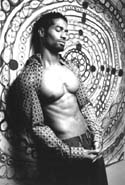 This said,
it wouldn't be fair to describe "True To Myself" as a
retro-album, because Eric's got his own take on the classical Soul. But the album's retro
in the sense of its lyrical content, emphasis on melodies instead of beats and it's filled
with the sounds of yesteryear; wah-wah, synth fuzz-bass, B3 organ, strings and Fender
Rhodes. So, what is it about the 70's that Eric appreciates so much? This said,
it wouldn't be fair to describe "True To Myself" as a
retro-album, because Eric's got his own take on the classical Soul. But the album's retro
in the sense of its lyrical content, emphasis on melodies instead of beats and it's filled
with the sounds of yesteryear; wah-wah, synth fuzz-bass, B3 organ, strings and Fender
Rhodes. So, what is it about the 70's that Eric appreciates so much?
-It has a lot do to with bravery and lack of concern commercially, I mean, back then
Marvin, Stevie, Donny Hathaway, they really, really dug deep within themselves. Not only
lyrically, but musically, they challenged us. I just think globally, spiritually,
something happened during the late 60's and 70's. We were all in this stream of spiritual
consciousness, I don't know how or why, but it was just very strong then and then it
became dormant for a while. But I honestly feel that whatever happened then is starting to
happen again. It shows in the music, it shows in the politics, in society and I think
we're on the verge of a spiritual awakening. It definitely reflects in music. Not only in
R&B, but in Rock, Pop and every other genre of music.
Eric Benét was born in Milwaukee,
Wisconsin, where he still lives. It may be prejudice to say, but in all honesty, Milwaukee
in the conservative, American mid-west is not exactly the place you'd expect a new, but
the same time traditional R&B artist to emerge from.
-Yeah, well, Eric laughed. When you think about it, the most conservative towns in the
mid-west of the United States is like where the funkiest people were born. Prince,
Minneapolis, is probably the most conservative place that I could think of, other than
Milwaukee... I think it's something about the mid-west in general, like George Clinton is
from the mid-west, Jimi Hendrix was from the mid-west, Roger Troutman.. I think it has
something to do with, being born in this very, very conservative environment, for whatever
reason, I think it's almost a deviance of the "conservative-ness". When I make
R&B music, I'm not trying to make R&B music like it's being made right now, I'm
trying to do my own thing and I think that's pretty much what the other artists that I
just mentioned, it sounded like that was their approach too. It's almost like the ultra
conservative environment gives birth to that kind of creativity.
The singer/songwriter is the youngest
of five siblings and grew up constantly surrounded by music. According to Eric's press
bio, his home was so filled with music that it was akin to a non-stop opera. His mother
would not tell her children what to do, but sing; "go and clean your roooom"!
-Yeah, that's true. We sang all the time. All the time, in the house. My sisters and my
brother would figure out old Sylvers harmonies and any other complicated harmonies that
they could get their hands on. Not to perform in front for other people, not for any other
reason than just for us to sing. Everybody had an ear and perfect pitch and could play an
instrument. It was a very musical environment.
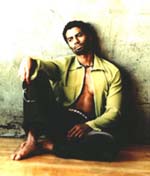 Singing in
church from an early age, Eric says made it clear how powerful music was. To him,
"it's not only this thing that soothes us and sounds good, but it's something that
God put us here to use to praise, heal and to uplift". Eric was no older than five
when he was first introduced to the music of Stevie Wonder. Singing in
church from an early age, Eric says made it clear how powerful music was. To him,
"it's not only this thing that soothes us and sounds good, but it's something that
God put us here to use to praise, heal and to uplift". Eric was no older than five
when he was first introduced to the music of Stevie Wonder.
-My sisters and my brother had a huge record collection and when I was like five, my
sister taught me how to use the little phonograph, you know, put the record on the
turntable, and I would sit there and listen to "Talking Book" over and over and
over again. Something happened way back then, it just engraved a creative foundation in my
soul somewhere. There was something about Stevie Wonder's lyrics and the music and his
voice. It kinda set the pace, so it's like, whenever I write a song now, I don't mean to
sound like Stevie Wonder with a lot of my writing and stuff, but it's just so deep inside
me, how much he touched me, that it's kinda hard to go far from it.
 "True To Myself" is
Eric's first album as a solo artist, but he's not a newcomer in the music business. Ever
since he was a small boy, he's always wanted to write and perform and after finishing
high-school, he and sister Lisa, along with cousin George Nash,
Jr. joined a Top 40 band. In 1992, Lisa and Eric recorded an album under the name
Benét on EMI records. "True To Myself" is
Eric's first album as a solo artist, but he's not a newcomer in the music business. Ever
since he was a small boy, he's always wanted to write and perform and after finishing
high-school, he and sister Lisa, along with cousin George Nash,
Jr. joined a Top 40 band. In 1992, Lisa and Eric recorded an album under the name
Benét on EMI records.
-With the Top 40 band, we did colleges around the mid-west, obscure cities that you've
probably never heard of. I've really paid my dues. But the thing about it was that the
people that owned this band, owned a recording studio, so when we weren't performing we
were able, my cousin, my sister and I, to go into the studio and write songs and that's
really how we got our deal with EMI. That's what we did when weren't doing these horrible
gigs! Because the only way you could make money in the mid-west in a band was to do cover
songs and so I would sing everything from Hammer's "You Can't Touch This" to
"My Prerogative" (laughs). But the constellation was, that under the two days
that we had off in the week, I was in the studio, writing. What Lisa and I did as Benét
was more of a collaborative effort, it was a little more adult contemporary, very
different from what I'm doing now
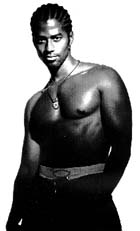 Because EMI was going through some major corporate changes at the
time, Benét got lost in the shuffle. The record didn't happen, but Eric found a friend in
Alison Ball-Gabriel, who had signed Eric and Lisa to EMI, and who also
contracted Eric to Warner Because EMI was going through some major corporate changes at the
time, Benét got lost in the shuffle. The record didn't happen, but Eric found a friend in
Alison Ball-Gabriel, who had signed Eric and Lisa to EMI, and who also
contracted Eric to Warner
-Alison, she believed in me a very, very long time ago. She's the Vice President of Black
A&R (at Warner). She became a very good friend to me. She hooked me up with some other
people to write with and she got me some jobs singing on other records, on Jazz records as
a guest vocalist. Jeff Lorber has also been an incredible friend. He
would hire me for different things that he was producing. I sang on Michael Franks,
every Jeff Lorber record since we met, Dave Koz' record, Eric
Marienthal. I went on a little tour with Jeff Lorber, had a lot of fun, but it
took me a little while to, this is after a few tragedies happened in my life, and I just
wasn't ready to go into the studio and do my own thing. And during the transition period,
Alison was a beautiful friend and so was Jeff. They believed me every step of the way. So
when it was time for me to get back in the studio and start writing, that was about the
time that Alison got her VP gig at Warner. I sent her some of the stuff I was doing and
she loved it. What I sent her was "True To Myself" and "I'll
Be There".
Eric revealed that he's not a great
musician ("I play very poorly, actually. I just dabble on keyboards and guitar, but I
just use it to write with") and shared that Warner gave him free hands with the
recording of the album.
-Yeah, they gave me a lot of freedom. They basically just told me to go make a record.
They left me alone and just let me do it. I definitely made the record I wanted to make,
because I did it in Milwaukee without Warner Brothers there at all and whenever I finished
a song, I just sent I to them and they said "we love it, send another one".
Actually, every time I sent in a song, I would get some comments, like "yeah, we love
it, but can you send something more radio friendly?" (laughs).
The majority of "True To
Myself" was recorded in Milwaukee. Eric co-wrote and produced every track
but one with George Nash, Jr. (guitar) and Demonté
(keyboards & drums). Christian Warren produced "Just
Friends", plus the current single "Femininity"
and played drums, keyboards, Rhodes and piano.
-Demonté Posey is a keyboard friend of mine and Christian is a brilliant producer from
Saint Louis, who I worked with during the period that I was doing Jazz guest vocal work.
We just hooked up and started writing songs together. I probably will be working with
George and Christian on my next record, as well.
One of the highlights was working with
the incomparable Roger Troutman. Roger produced, played keyboards, bass
and guitar and naturally lent his talk-box on the incredibly funky Sly Stone
cover "If You Want Me To Stay".
 -Yeah! I have Roger to thank for that. I've always
been in love with Sly Stone and it was suggested, I think it was Alison that suggested I'd
do a cover, and we were just tossing around ideas of what cover we would do and then it
was like "well, I think we should do a cover of Sly Stone with Roger". My vocal
approach to the song was.. I couldn't sing it like me, I couldn't sing that song how I
sing it, because so much of that song is Sly Stone's rawness and grit and un-expurgated
funk, so the only way I could get away with it was to try and do an impression, an
impersonation of Sly when I sang it. Roger is an incredible friend and he had so much
knowledge to give me, from a technical standpoint in the studio, as far as productions
techniques, to song writing techniques, to the psychological effects of having a hit and
then not having a hit and having a hit again. Just watching how people so conditionally
love you (laughs) and how that affects you and having it not affect you too detrimentally
and protecting yourself from that. Not to mention, he's just funky as hell! He's so fun to
be with and I was just in the studio with him in awe, first of all, you know "I'm in
the studio with Roger Troutman" and the amazing thing was, he was producing the
track, but his decisions were based upon my decisions. So it was like "here I am; a
nobody from Milwaukee, Wisconsin, meeting Roger Troutman, being in the studio with
him" and he never made a move without going to me and saying "what do you think
we should do here?". In other words, his ego was non-existent, my creativity was
respected by him. I got nothing but love for Roger Troutman. -Yeah! I have Roger to thank for that. I've always
been in love with Sly Stone and it was suggested, I think it was Alison that suggested I'd
do a cover, and we were just tossing around ideas of what cover we would do and then it
was like "well, I think we should do a cover of Sly Stone with Roger". My vocal
approach to the song was.. I couldn't sing it like me, I couldn't sing that song how I
sing it, because so much of that song is Sly Stone's rawness and grit and un-expurgated
funk, so the only way I could get away with it was to try and do an impression, an
impersonation of Sly when I sang it. Roger is an incredible friend and he had so much
knowledge to give me, from a technical standpoint in the studio, as far as productions
techniques, to song writing techniques, to the psychological effects of having a hit and
then not having a hit and having a hit again. Just watching how people so conditionally
love you (laughs) and how that affects you and having it not affect you too detrimentally
and protecting yourself from that. Not to mention, he's just funky as hell! He's so fun to
be with and I was just in the studio with him in awe, first of all, you know "I'm in
the studio with Roger Troutman" and the amazing thing was, he was producing the
track, but his decisions were based upon my decisions. So it was like "here I am; a
nobody from Milwaukee, Wisconsin, meeting Roger Troutman, being in the studio with
him" and he never made a move without going to me and saying "what do you think
we should do here?". In other words, his ego was non-existent, my creativity was
respected by him. I got nothing but love for Roger Troutman.
Other album cuts that have attracted
much attention in the press are the socially conscious "Chains"
and "What If We Was Cool" (which was co-written by Roger
Troutman and Zapp-member Dale De Groat). I asked Eric what inspired him
to write those tracks and if he writes from personal experience.
-I just tried to write about what moved me the most and what's moved me in my life. But in
the song "Chains", I talk about sexual abuse and drug addiction
and prostitution and I never had to deal with those things personally, but there's also a
verse where someone gave up on their dreams because they just lost faith in themselves.
Basically, "Chains" is dealing with breaking free of your own self imprisonment,
whatever it is. And I had to deal with that for a few years. I was afraid to make this
album, because of what we were just talking about, because I was thinking "no way the
industry will be down for something like this" and "no way would radio will play
it", you know. Eventually, I just realized that I gotta break these chains and I just
gotta do what I gotta do and keep it real. So, I just think that when I write, I write
best if I write from my own personal battles and achievements and victories, t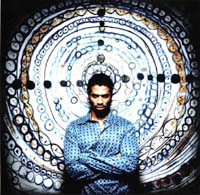 hat's what works best for me, as opposed to writing about how much money I
have, how many women I have or.. To me, that's really pretty incidental, it really doesn't
really matter in the big scheme of things. It's about what truths did you learn and how
did you find validity in your life and how do you praise God for the gifts that he's given
you. That's what's important to me, so I just write about what's important.. Now, "What
If We Was Cool", you could interpret it as a love song, but it's not. It
kinda creeps up on you like a relation song, but it really isn't. The song is actually
about the ignorance of society, it's about racism, not understanding each other and just
understanding some very simple truths, like that sometime it's OK to disagree, just as
long as we respect each other in the process. It would just make things so much easier if
that was truly the case, if we didn't fear someone because of their culture or because of
their way of life, but looked at them and said "you love your children just like I
love my children, basically you want just what I want, so why can't we just be cool with
that." hat's what works best for me, as opposed to writing about how much money I
have, how many women I have or.. To me, that's really pretty incidental, it really doesn't
really matter in the big scheme of things. It's about what truths did you learn and how
did you find validity in your life and how do you praise God for the gifts that he's given
you. That's what's important to me, so I just write about what's important.. Now, "What
If We Was Cool", you could interpret it as a love song, but it's not. It
kinda creeps up on you like a relation song, but it really isn't. The song is actually
about the ignorance of society, it's about racism, not understanding each other and just
understanding some very simple truths, like that sometime it's OK to disagree, just as
long as we respect each other in the process. It would just make things so much easier if
that was truly the case, if we didn't fear someone because of their culture or because of
their way of life, but looked at them and said "you love your children just like I
love my children, basically you want just what I want, so why can't we just be cool with
that."
Of the album's 13 tracks, "While
You Were Here" is perhaps the most personal. It's a tortured and painful
song about loss, where Eric comes as close to baring his soul on record, as anyone
possibly can.
-I have a five-year old daughter and the mother, Tami, my ex-girlfriend, she died in a car
accident when my daughter India was thirteen months old. And that song is about my remorse
and my regret for... You know, in retrospect, I didn't appreciate the love that Tami had
for me. Sometimes you're not just able to see how much someone loves you and how beautiful
it is and that's definitely what's happened. And then just about the time I started to
realize, what a treasure Tami and I had together, I'm not talking about our daughter,
that's obvious from the beginning, I'm talking about the love that we had for each other,
then it was too late. It just kills me how I'm gonna have to deal with that for the rest
of my life and what my daughter means to me and what Tami's love meant to me and how it's
changed me and how I've matured from the whole experience.
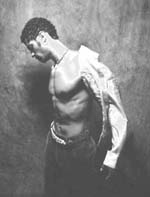 What are
you trying to say in the song that sums up the whole album, "True To Myself",
I wondered? What are
you trying to say in the song that sums up the whole album, "True To Myself",
I wondered?
-Well, what to be true to myself means.. I'll try and answer this without sounding too
cocky, Eric laughed. I perceive my song writing and my music as something different and I
think it's different for a few reasons. I think it's different because A: I am not too
concerned with radio and what radio is playing and B: Lyrically and musically it seems
like to me that I'm digging a lot deeper with personal experiences and pain. I'm not
really trying to jump on any bandwagon, that was really was my approach to making this
record, I really didn't try to make a "retro-Soul" record, I just tried to write
the kind of music that made me fall in love with music from a very early age and
lyrically, I tried to put these things down on paper that made me come to this point,
where in my life right now I've gotten a "I don't really give a shit attitude"
about what people think. I just gotta say what's in my heart and that song "True to
Myself" came to me at a time when I had just gone through whole lot of shit. I was
with dealing with the death of Tami, dealing with all these questions, "how am I
gonna be a single father now? Being a single parent, does that mean I have to get a
nine-to five job and conform to what my parents and a lot of my family kinda expects of me
right now? Or do I keep pursuing my dream, because I think in the end it's gonna be the
best for my daughter and me? And while doing that, do I try and take the approach that is
apparently is going to make the most money, which would mean just doing what everyone else
on the radio is doing, which is talking about things that doesn't go too deep and making
music that doesn't go too deep?" I just kind of wrote "True To Myself",
which is my approach of how I'm gonna live my life and it set the theme for the rest of
the record.
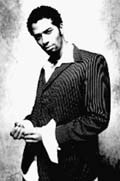 As for the
future, the down-to-earth Eric isn't dreaming of becoming a big star and living in a
mansion. Not surprisingly, his ambitions stretches far beyond that. As for the
future, the down-to-earth Eric isn't dreaming of becoming a big star and living in a
mansion. Not surprisingly, his ambitions stretches far beyond that.
-What I like to do, I like to keep making music. I'd like to just build a foundation and
be respected for what I do and then just fade into the background and produce other
people. I've got my daughter in a pretty nice school and we're not really wanting for
anything right now and I just like to keep it like that. I want India and I to be able to
walk down the street, not have a whole bunch of people mob us, you know? Don't get me
wrong, I appreciate my fans and people who love the music, but to be on a level of, I
mean, I would imagine even R. Kelly right now, he probably can't go to the store. That's
terrifying! I can go to the store and do anything I wanna do, nobody knows who I am!
(laughs). No, that's not true. People recognize me, but they just go "hey Eric, heard
the album, love it" and that's it. There are no teenagers crying and pleading for me
and I like it like it is right now. I'd like to produce other artists and eventually have
my own record label. I'd like to sign artists, if it's Hip-Hop or alternative Rock, I just
wanna sign artists and musicians that are gonna make a difference, who've got something
positive and different to offer.
|

 Eric
Benét is a man of music, and good music at that, as his album "True
To Myself " and singles clearly illustrates. This 27-year old
singer/songwriter from Milwaukee, Wisconsin, is definitely on to something that you don't
wanna miss. Not only does he possess a smooth and expressive tenor, but his lyrics reach
way beyond those tedious "bump'n'grind" lines that sadly infest so much of
today's contemporary R&B. Couple that with strong melodies and a warm, funky, 70's
styled instrumentation and it's only natural that Benét is being compared to Maxwell
and D'Angelo; but that's a likening the friendly and eloquent Eric Benét
doesn't mind at all.
Eric
Benét is a man of music, and good music at that, as his album "True
To Myself " and singles clearly illustrates. This 27-year old
singer/songwriter from Milwaukee, Wisconsin, is definitely on to something that you don't
wanna miss. Not only does he possess a smooth and expressive tenor, but his lyrics reach
way beyond those tedious "bump'n'grind" lines that sadly infest so much of
today's contemporary R&B. Couple that with strong melodies and a warm, funky, 70's
styled instrumentation and it's only natural that Benét is being compared to Maxwell
and D'Angelo; but that's a likening the friendly and eloquent Eric Benét
doesn't mind at all. This said,
it wouldn't be fair to describe "True To Myself" as a
retro-album, because Eric's got his own take on the classical Soul. But the album's retro
in the sense of its lyrical content, emphasis on melodies instead of beats and it's filled
with the sounds of yesteryear; wah-wah, synth fuzz-bass, B3 organ, strings and Fender
Rhodes. So, what is it about the 70's that Eric appreciates so much?
This said,
it wouldn't be fair to describe "True To Myself" as a
retro-album, because Eric's got his own take on the classical Soul. But the album's retro
in the sense of its lyrical content, emphasis on melodies instead of beats and it's filled
with the sounds of yesteryear; wah-wah, synth fuzz-bass, B3 organ, strings and Fender
Rhodes. So, what is it about the 70's that Eric appreciates so much? Singing in
church from an early age, Eric says made it clear how powerful music was. To him,
"it's not only this thing that soothes us and sounds good, but it's something that
God put us here to use to praise, heal and to uplift". Eric was no older than five
when he was first introduced to the music of Stevie Wonder.
Singing in
church from an early age, Eric says made it clear how powerful music was. To him,
"it's not only this thing that soothes us and sounds good, but it's something that
God put us here to use to praise, heal and to uplift". Eric was no older than five
when he was first introduced to the music of Stevie Wonder. "True To Myself" is
Eric's first album as a solo artist, but he's not a newcomer in the music business. Ever
since he was a small boy, he's always wanted to write and perform and after finishing
high-school, he and sister Lisa, along with cousin George Nash,
Jr. joined a Top 40 band. In 1992, Lisa and Eric recorded an album under the name
Benét on EMI records.
"True To Myself" is
Eric's first album as a solo artist, but he's not a newcomer in the music business. Ever
since he was a small boy, he's always wanted to write and perform and after finishing
high-school, he and sister Lisa, along with cousin George Nash,
Jr. joined a Top 40 band. In 1992, Lisa and Eric recorded an album under the name
Benét on EMI records. Because EMI was going through some major corporate changes at the
time, Benét got lost in the shuffle. The record didn't happen, but Eric found a friend in
Alison Ball-Gabriel, who had signed Eric and Lisa to EMI, and who also
contracted Eric to Warner
Because EMI was going through some major corporate changes at the
time, Benét got lost in the shuffle. The record didn't happen, but Eric found a friend in
Alison Ball-Gabriel, who had signed Eric and Lisa to EMI, and who also
contracted Eric to Warner -Yeah! I have Roger to thank for that. I've always
been in love with Sly Stone and it was suggested, I think it was Alison that suggested I'd
do a cover, and we were just tossing around ideas of what cover we would do and then it
was like "well, I think we should do a cover of Sly Stone with Roger". My vocal
approach to the song was.. I couldn't sing it like me, I couldn't sing that song how I
sing it, because so much of that song is Sly Stone's rawness and grit and un-expurgated
funk, so the only way I could get away with it was to try and do an impression, an
impersonation of Sly when I sang it. Roger is an incredible friend and he had so much
knowledge to give me, from a technical standpoint in the studio, as far as productions
techniques, to song writing techniques, to the psychological effects of having a hit and
then not having a hit and having a hit again. Just watching how people so conditionally
love you (laughs) and how that affects you and having it not affect you too detrimentally
and protecting yourself from that. Not to mention, he's just funky as hell! He's so fun to
be with and I was just in the studio with him in awe, first of all, you know "I'm in
the studio with Roger Troutman" and the amazing thing was, he was producing the
track, but his decisions were based upon my decisions. So it was like "here I am; a
nobody from Milwaukee, Wisconsin, meeting Roger Troutman, being in the studio with
him" and he never made a move without going to me and saying "what do you think
we should do here?". In other words, his ego was non-existent, my creativity was
respected by him. I got nothing but love for Roger Troutman.
-Yeah! I have Roger to thank for that. I've always
been in love with Sly Stone and it was suggested, I think it was Alison that suggested I'd
do a cover, and we were just tossing around ideas of what cover we would do and then it
was like "well, I think we should do a cover of Sly Stone with Roger". My vocal
approach to the song was.. I couldn't sing it like me, I couldn't sing that song how I
sing it, because so much of that song is Sly Stone's rawness and grit and un-expurgated
funk, so the only way I could get away with it was to try and do an impression, an
impersonation of Sly when I sang it. Roger is an incredible friend and he had so much
knowledge to give me, from a technical standpoint in the studio, as far as productions
techniques, to song writing techniques, to the psychological effects of having a hit and
then not having a hit and having a hit again. Just watching how people so conditionally
love you (laughs) and how that affects you and having it not affect you too detrimentally
and protecting yourself from that. Not to mention, he's just funky as hell! He's so fun to
be with and I was just in the studio with him in awe, first of all, you know "I'm in
the studio with Roger Troutman" and the amazing thing was, he was producing the
track, but his decisions were based upon my decisions. So it was like "here I am; a
nobody from Milwaukee, Wisconsin, meeting Roger Troutman, being in the studio with
him" and he never made a move without going to me and saying "what do you think
we should do here?". In other words, his ego was non-existent, my creativity was
respected by him. I got nothing but love for Roger Troutman. hat's what works best for me, as opposed to writing about how much money I
have, how many women I have or.. To me, that's really pretty incidental, it really doesn't
really matter in the big scheme of things. It's about what truths did you learn and how
did you find validity in your life and how do you praise God for the gifts that he's given
you. That's what's important to me, so I just write about what's important.. Now, "What
If We Was Cool", you could interpret it as a love song, but it's not. It
kinda creeps up on you like a relation song, but it really isn't. The song is actually
about the ignorance of society, it's about racism, not understanding each other and just
understanding some very simple truths, like that sometime it's OK to disagree, just as
long as we respect each other in the process. It would just make things so much easier if
that was truly the case, if we didn't fear someone because of their culture or because of
their way of life, but looked at them and said "you love your children just like I
love my children, basically you want just what I want, so why can't we just be cool with
that."
hat's what works best for me, as opposed to writing about how much money I
have, how many women I have or.. To me, that's really pretty incidental, it really doesn't
really matter in the big scheme of things. It's about what truths did you learn and how
did you find validity in your life and how do you praise God for the gifts that he's given
you. That's what's important to me, so I just write about what's important.. Now, "What
If We Was Cool", you could interpret it as a love song, but it's not. It
kinda creeps up on you like a relation song, but it really isn't. The song is actually
about the ignorance of society, it's about racism, not understanding each other and just
understanding some very simple truths, like that sometime it's OK to disagree, just as
long as we respect each other in the process. It would just make things so much easier if
that was truly the case, if we didn't fear someone because of their culture or because of
their way of life, but looked at them and said "you love your children just like I
love my children, basically you want just what I want, so why can't we just be cool with
that." What are
you trying to say in the song that sums up the whole album, "True To Myself",
I wondered?
What are
you trying to say in the song that sums up the whole album, "True To Myself",
I wondered? As for the
future, the down-to-earth Eric isn't dreaming of becoming a big star and living in a
mansion. Not surprisingly, his ambitions stretches far beyond that.
As for the
future, the down-to-earth Eric isn't dreaming of becoming a big star and living in a
mansion. Not surprisingly, his ambitions stretches far beyond that.